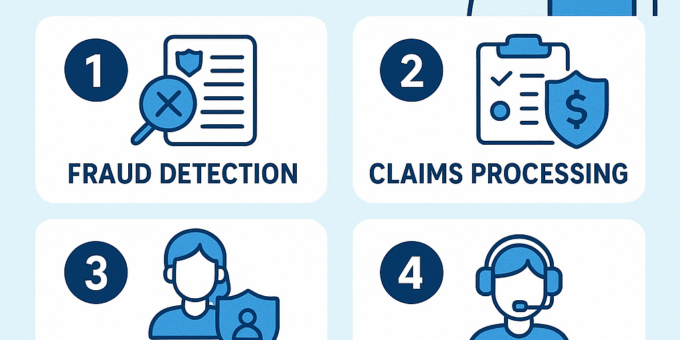
Artificial Intelligence in Insurance
Artificial Intelligence (AI) is not just another buzzword in the insurance industry—it’s a full-blown revolution. From transforming the way claims are processed to completely redefining customer experiences, AI is helping insurers operate more efficiently, reduce costs, and deliver services faster than ever before.
In today’s data-driven world, insurance companies are leveraging AI to streamline operations, enhance fraud detection, personalize offerings, and predict future risks with astonishing accuracy. With rising customer expectations and increasing competition from Insurtech startups, the need for AI-driven transformation is no longer optional—it’s essential.
Let’s dive into the top 7 ways artificial intelligence is transforming insurance and reshaping the entire landscape of the industry.
Enhanced Customer Service with AI Chatbots
One of the most visible applications of AI in insurance is customer service enhancement. AI-powered chatbots and virtual assistants are available 24/7, offering policyholders instant responses to inquiries, quote generation, claim status updates, and policy renewals.
These intelligent systems reduce wait times, improve customer satisfaction, and free up human agents to handle more complex queries. Chatbots like Allstate’s “ABIE” and GEICO’s “Kate” are revolutionizing service delivery, proving that automation and personalization can indeed go hand-in-hand.
Streamlined Claims Processing
Gone are the days of filling endless forms and waiting weeks for a claim to be approved. With AI, claims processing is faster, smarter, and more accurate. Machine learning algorithms can now assess claim validity, analyze images or videos of damages, and automatically approve standard claims within minutes.
By automating repetitive tasks and integrating AI with mobile apps, insurers not only reduce human error but also speed up settlements, drastically improving the policyholder experience. Lemonade, for example, boasts of settling some claims in under three seconds—a true testament to AI efficiency.
Intelligent Underwriting with Predictive Analytics
Traditional underwriting processes often involve manual reviews and historical data analysis, which can be time-consuming and error-prone. Enter AI-powered predictive analytics, which allows underwriters to evaluate risk using a broader and more dynamic set of data, including social media, wearables, credit scores, and more.
This ensures faster policy issuance, more accurate risk assessment, and improved pricing models. Companies like Zurich Insurance are already using AI models to underwrite commercial policies in minutes instead of days.
Fraud Detection and Prevention
Insurance fraud costs billions of dollars annually. Thankfully, AI is turning the tide. By using machine learning algorithms, insurers can identify suspicious patterns, detect anomalies, and flag fraudulent claims in real time.
AI systems analyze large volumes of data from multiple sources—such as past claims, customer profiles, and geolocation—to pinpoint inconsistencies that may go unnoticed by human investigators. This proactive approach not only saves money but also ensures genuine claims are processed swiftly, enhancing trust in the system.
Personalized Insurance Policies
One-size-fits-all policies are becoming a thing of the past. AI enables insurers to offer personalized, usage-based insurance plans that reflect individual behaviors and preferences. For example, AI can assess a driver’s behavior through telematics and provide tailored auto insurance quotes.
Similarly, health insurers can use data from wearables and fitness trackers to offer incentives for healthy behavior. The result? Higher customer satisfaction, increased engagement, and better risk management.
AI-Powered Risk Management
Risk management is the backbone of insurance, and AI has taken it to the next level. By using IoT sensors, drones, weather forecasting models, and satellite imagery, insurers can now monitor and mitigate risk in real-time.
Imagine being alerted before a flood hits your property, or your insurance premium automatically adjusting based on your driving habits—AI makes this possible. This proactive approach not only reduces claims but also empowers customers to prevent losses before they occur.
Predictive Analytics for Better Forecasting
AI allows insurers to forecast market trends, predict claims frequency, and allocate resources more effectively. Predictive analytics models analyze both structured and unstructured data—emails, reports, social media, and more—to provide actionable insights.
This capability is especially valuable in anticipating natural disasters, economic downturns, or emerging health threats, enabling insurers to prepare ahead of time and make data-driven decisions.
Conclusion: The AI-Driven Insurance Era
The integration of AI into insurance is no longer futuristic—it’s happening now. From streamlining operations to reshaping customer engagement, artificial intelligence is redefining how insurance is bought, sold, and serviced.
Insurers who embrace this transformation early will reap the rewards of operational efficiency, reduced costs, and improved customer loyalty. Those who delay risk falling behind in a rapidly evolving market.
Whether you’re a consumer or an insurance executive, one thing is clear—AI is the future of insurance. And the future is already here.